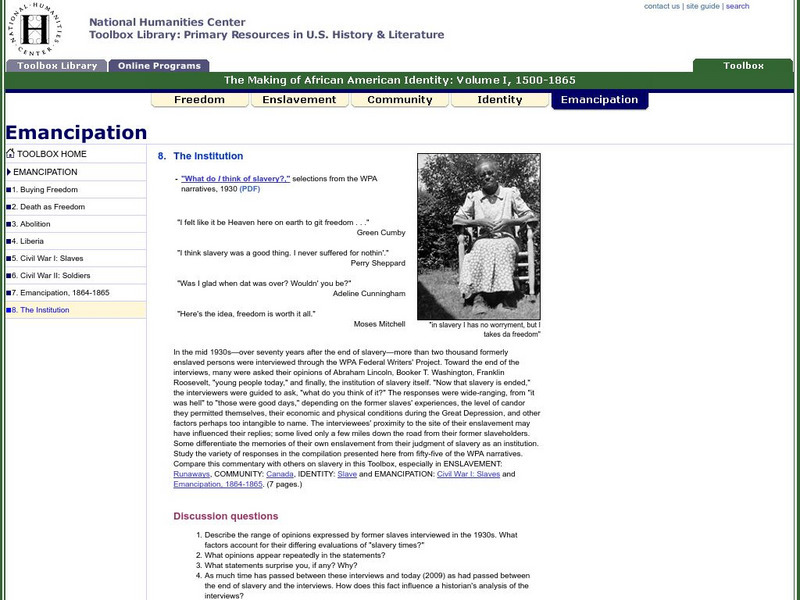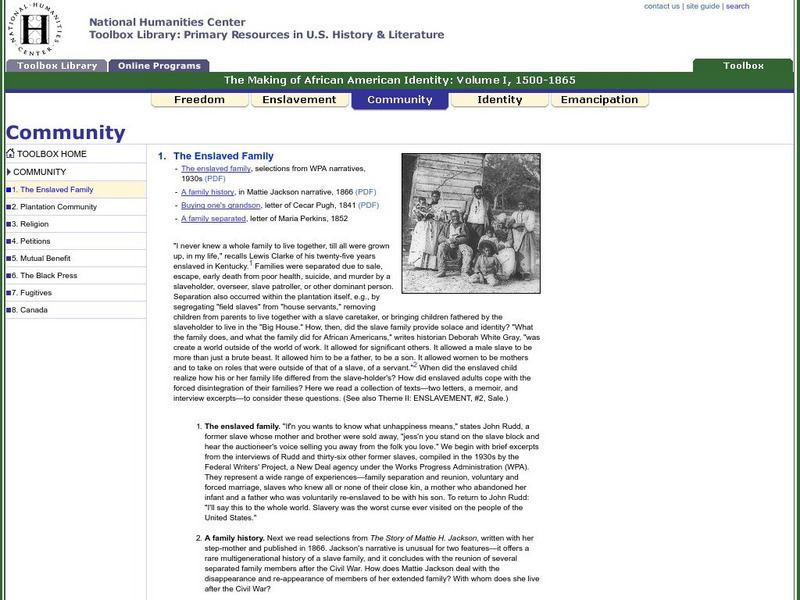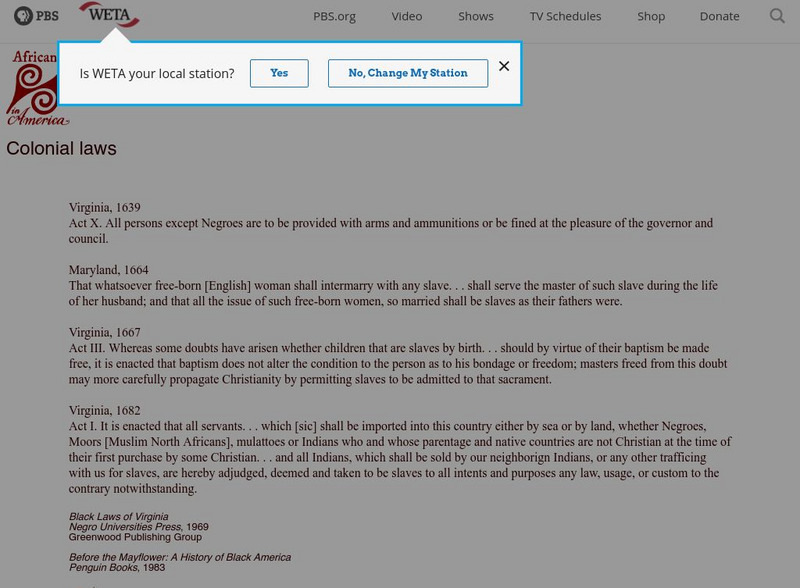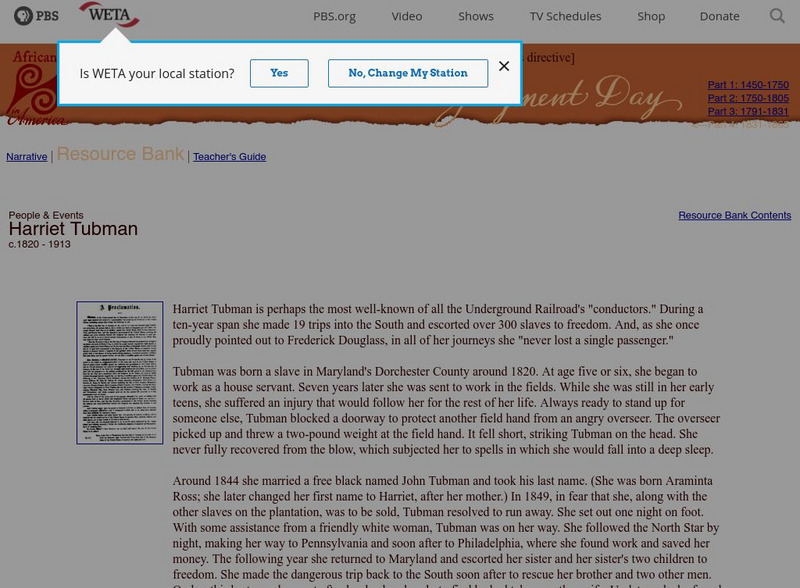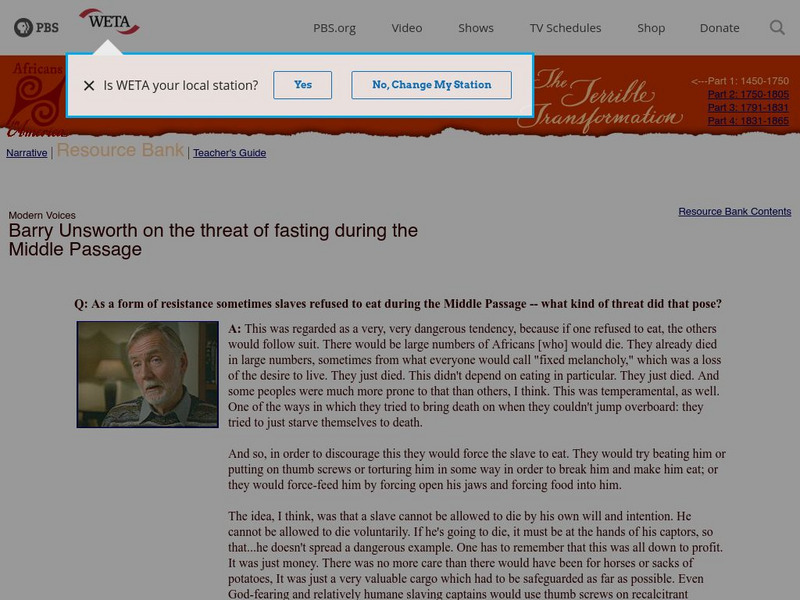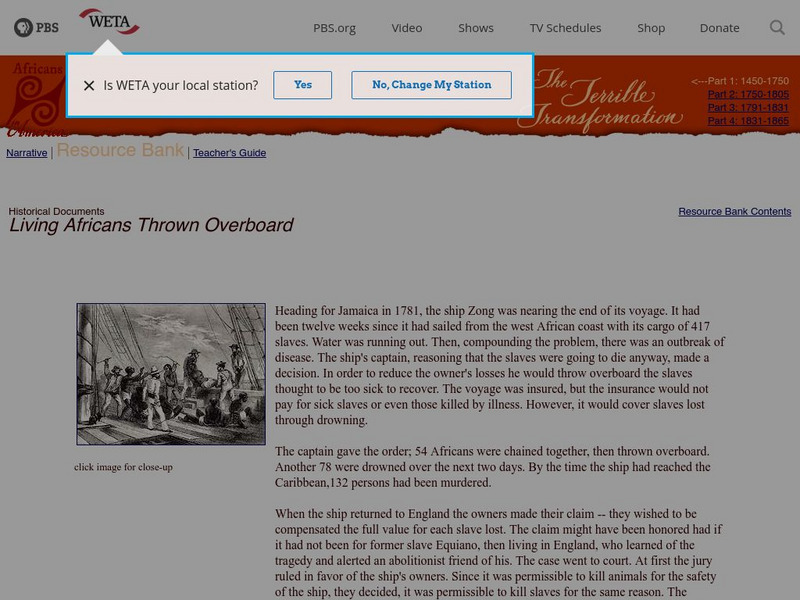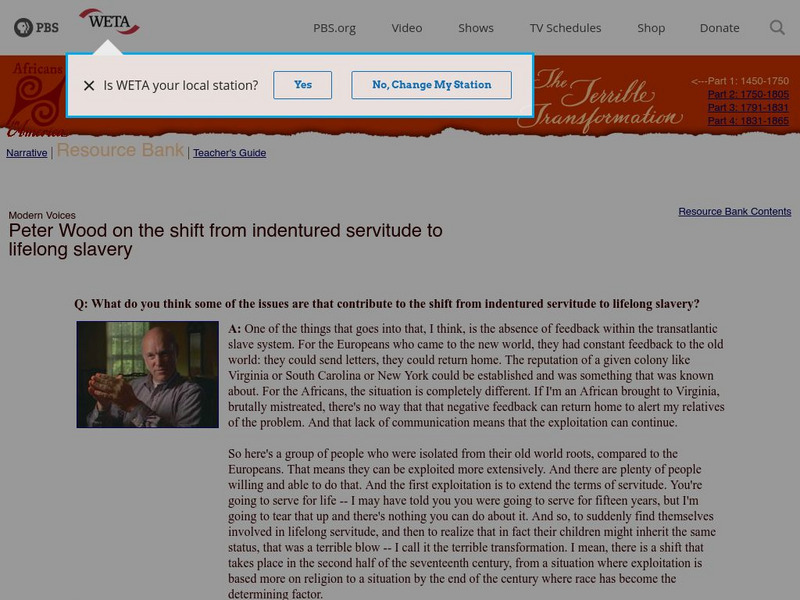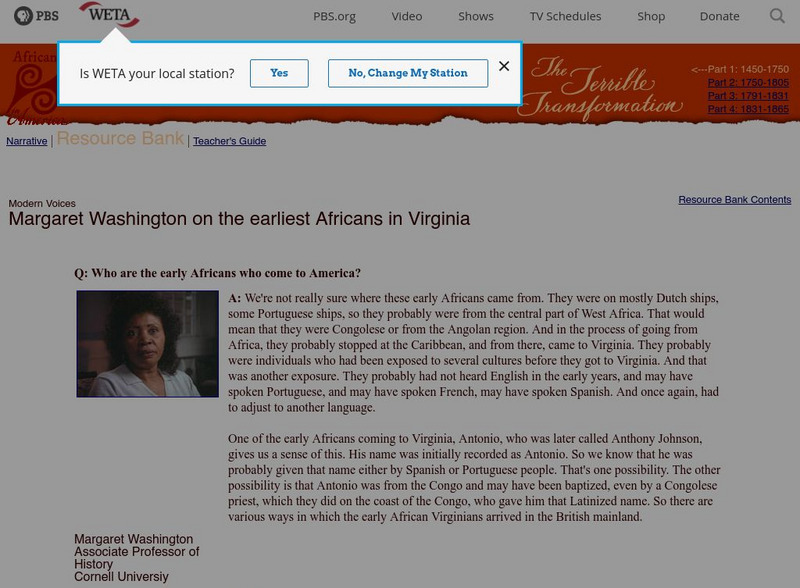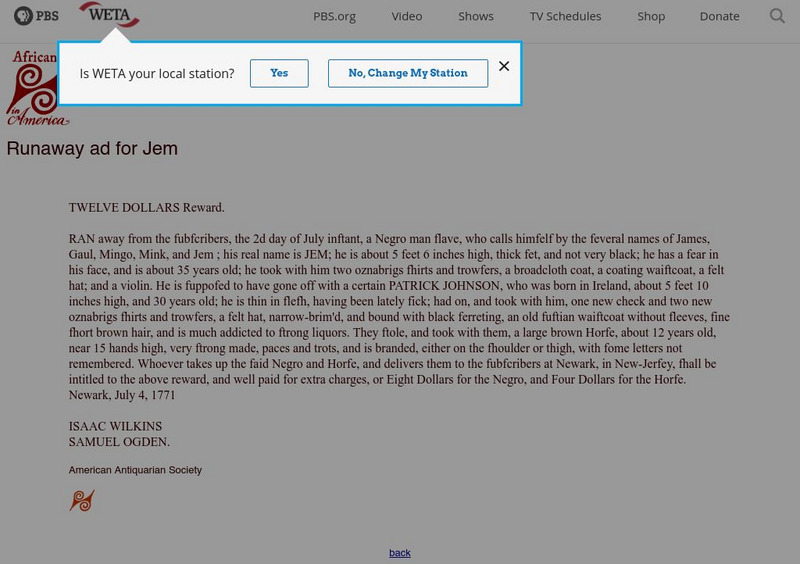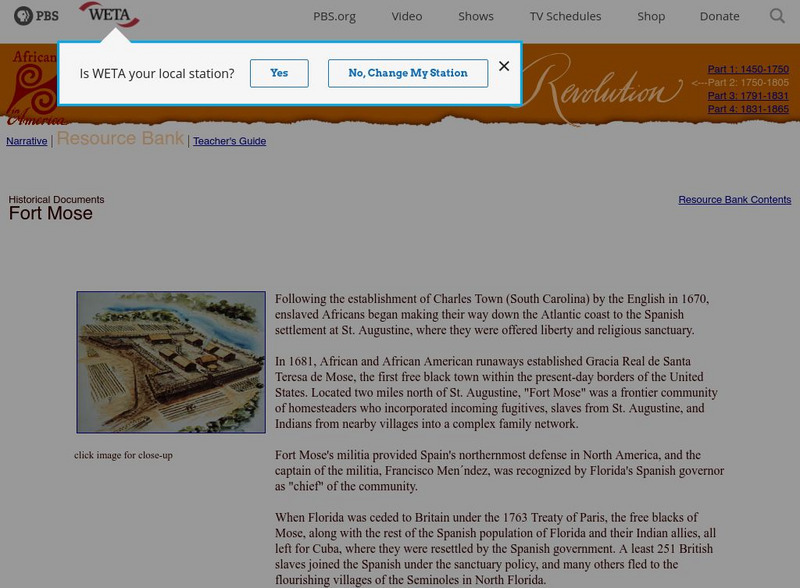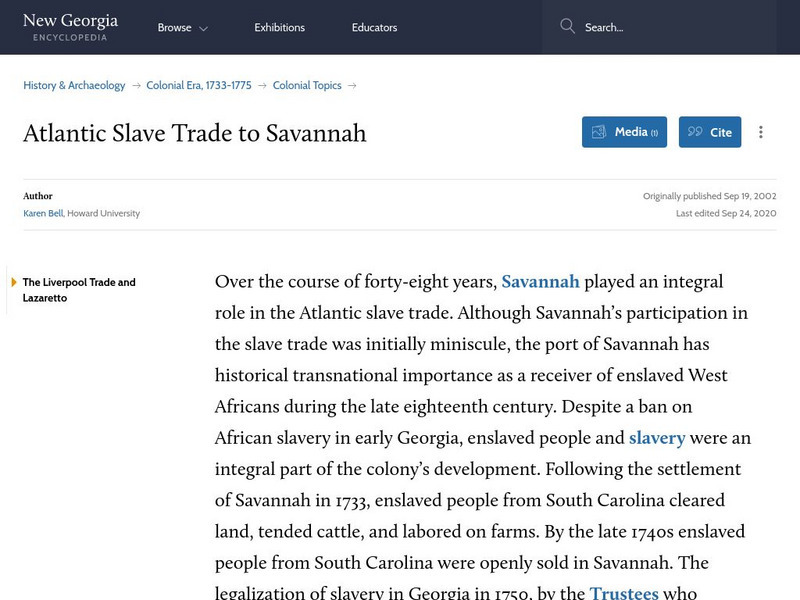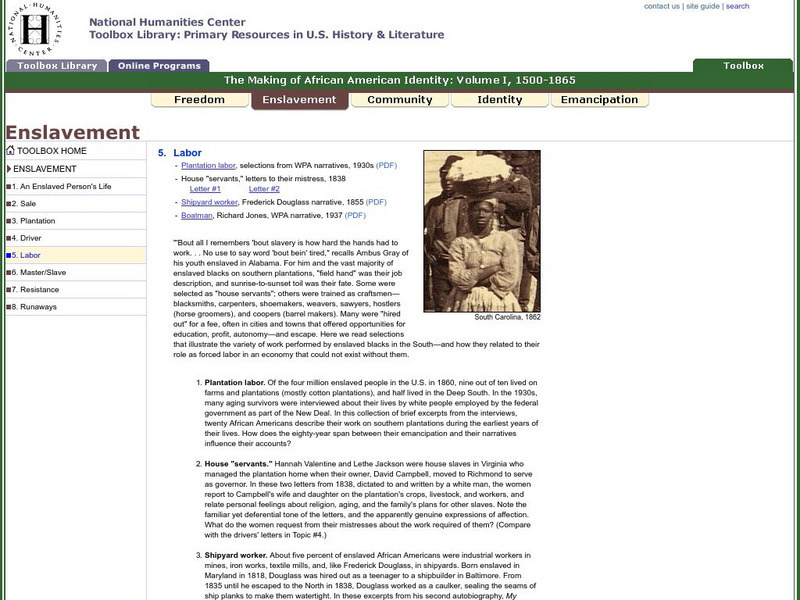Hi, what do you want to do?
CommonLit
Common Lit: "Promises to Keep: How Jackie Robinson Changed America" S. Robinson
Selected (17) reading passages (grades 5-11) to pair with "Promises to Keep: How Jackie Robinson Changed America" by Sharon Robinson. In Promises To Keep, Sharon Robinson, daughter of the baseball legend, shares memories of her famous...
National Humanities Center
National Humanities Center: Toolbox Library: America in 1850: Henry Clay: Review of the Debate on the Compromise Bills
Henry Clay's speech in the Senate in support of the Compromise of 1850 and the importance of preserving the Union.
Digital Public Library of America
Dpla: The American Abolitionist Movement
The resources in this set highlight the people and political acts that were central to the abolitionist movement.
National Humanities Center
National Humanities Center: Toolbox Library: The Institution, Making of African American Identity: V. 1
Interviews from the 1930s that reflect on African Americans' experience of the institution of slavery. A narrative with firsthands accounts is linked within this resource.
A&E Television
History.com: How Civil War Medicine Led to America's First Opioid Crisis
During the Civil War, military hospitals considered opioids to be essential medicine. Doctors and nurses used opium and morphine to treat soldiers' pain, stop internal bleeding and mitigate vomiting and diarrhea caused by infectious...
Library of Congress
Loc: The African American Odyssey: A Quest for Full Citizenship
Online exhibit from the Library of Congress explores black America's quest for equality from the early national period through the twentieth century. Exhibit contains a wealth of items including books, government documents, manuscripts,...
National Humanities Center
National Humanities Center: Toolbox Library: The Enslaved Family, Making of African American Identity: Vol. 1
This site offers two letters and a memoir from the mid-nineteenth century, and interviews from the early-twentieth century, about the importance and the roles of enslaved families.
Georgia Humanities Council and the University of Georgia Press.
New Georgia Encyclopedia: The Butler Family
An entry on the Butler family who owned large plantations on the Sea Islands. The "patriarch" was Pierce Butler who also served as a delegate to the Constitutional Convention.
PBS
Africans in America: Colonial Laws
Read some excerpts from original colonial laws concerning slaves.
PBS
Pbs: Africans in America: Harriet Tubman (1820 1913)
Here is a brief article from PBS on the life and accomplishments of abolitionist Harriet Tubman, who risked her life on several occasions to ensure the freedom of others. Links to a teacher's guide and primary sources are provided.
PBS
Africans in America: William Byrd's Diary
Excerpts from "The Secret Diary of William Byrd" in which, among other things, he describes slaves as piece of property.
PBS
Pbs: Cet: Africans in America: The Threat of Fasting During the Middle Passage
Description of how slaves tried to starve themselves to death on slave ships as a form of resistance, and how the slave traders forced them to eat so they would not lose money. Click on Teacher's Guide for teaching resources.
PBS
Africans in America: Living Africans Thrown Overboard
This site is provided for by PBS. In order to receive insurance money, a captain ordered 132 slaves thrown overboard alive. The case went to court, and a landmark decision was made that the Africans on the ship were actually people.
PBS
Pbs: Africans in America: Shift From Indentured Servitude to Lifelong Slavery
This discussion by Prof. Peter Wood of Duke University explores what may have allowed the shift from indentured servitude to lifelong slavery for Africans and their children. Click on Teacher's Guide for teacher resources.
PBS
Africans in America: Margaret Washington on the Earliest Africans in Va.
In a brief answer, Margaret Washington, Assoc. Professor of History at Cornell University, discusses where the first Africans to colonial Virginia were from, who they were, and what it may have been like for them.
PBS
Africans in America: Runaway Slave Ad From Colonial New Jersey
Here from PBS is the original text of a runaway slave ad for a slave named Jem. His owner in Newark, New Jersey describes him and offers a reward.
PBS
Africans in America: Fort Mose
This website from PBS describes how Fort Mose was established by runaway slaves in Spanish Florida. It also explains what happened to the inhabitants after Spain lost control of Florida.
Cornell University
Cornell University: Library: Abolitionism in America: Introduction
The introduction of an extensive website from the Cornell University Library, which includes text, documents, and other primary sources in an examination of the anti-slavery movement known as abolitionism.
PBS
Wnet: Thirteen: Freedom: A History of Us: Wake Up, America!
This resource covers the changing of America due to the Industrial Revolution which brought in not only new technology but also opened the door to reform movements. From the series by Joy Hakim, "A History of Us." Includes a teacher's...
Library of Congress
Loc: America's Story: Detective Allan Pinkerton
Allan Pinkerton saved Abraham Lincoln from an assassination attempt, started the United States Secret Service and helped slaves seek freedom via the Underground Railroad. Learn about his early life in Scotland and view a photograph of...
Digital Public Library of America
Dpla: Torn in Two: Mapping the American Civil War
This exhibition tells the story of the American Civil War both nationally and locally in Boston, Massachusetts, through maps, documents, letters, and other primary sources.
National Humanities Center
National Humanities Center: Toolbox Library: Enslaved Peoples, American Beginnings: 1492 1690
Two Spanish accounts of enslaved Indians in the Caribbean and enslaved Africans in Mexico and statements of the difficulty of maintaining slavery and the lurking threat of a slave revolt.
Georgia Humanities Council and the University of Georgia Press.
New Georgia Encyclopedia: Atlantic Slave Trade to Savannah
Encyclopedia article describing slavery in Colonial Georgia and the role that Savannah played in slave trade from 1755 to as late as 1858.
National Humanities Center
National Humanities Center: Toolbox Library: Labor, Making of African American Identity: V. 1
Selections of original accounts either written during slavery or recorded in the 1930s that depict work as a plantation laborer, house servant, shipyard worker or boatman.







